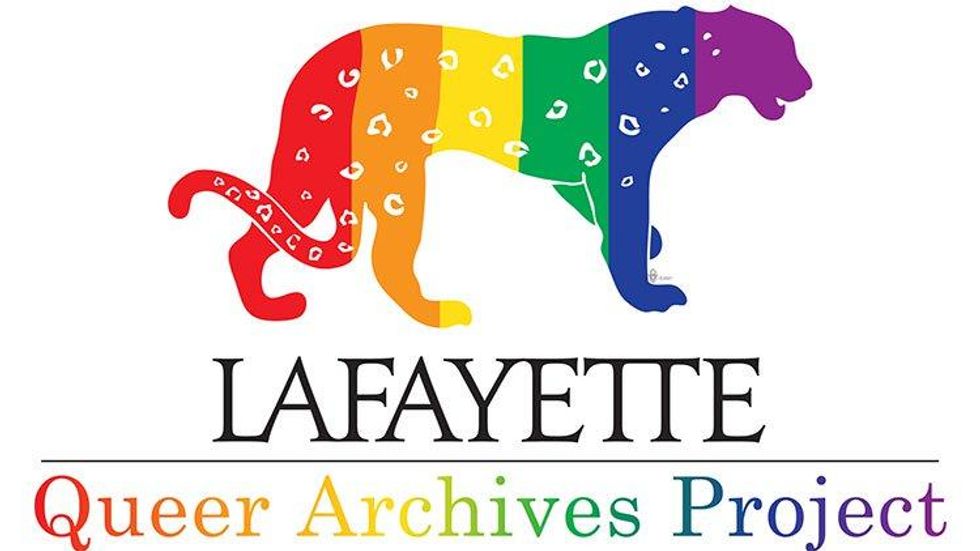For most U.S. colleges and universities, heteronormativity, homophobia, and transphobia belong to school history as decisively as fraternities, football, and final exams. Lafayette College in Easton, Penn., where I am a professor, is no different.
In fact, Lafayette has historically been an overachiever. In 1992, the popular Princeton Review named Lafayette the most "homophobic" institution of higher education in the U.S. and (unsurprisingly) the school with most "gays still in the closet." For the past quarter century, as it has climbed in the national rankings of liberal arts colleges, these grim honors have remained embarrassing reference points for an elite and increasingly diverse institution.
These days, however, the students, faculty, and administration of Lafayette College are developing a different relationship to the college's LGBTQ+ past -- and feeling a lot better about the future. This is thanks to a groundbreaking undertaking called the Queer Archives Project, a multi-part initiative designed to illuminate the college's LGBTQ+ past while advancing teaching, learning, and research in the area of queer studies and promoting positive institutional transformation.
The Queer Archives Project started in the classroom by way of my women's and gender studies course "sexuality studies," which examines the development of modern queer identities and cultures. Because the college had never tried to learn about its LGBTQ+ history, I asked students to partner with the college archives, ask research questions about LGBTQ+ life at Lafayette, and see what they could find.
They found plenty. Director of Special Collections Diane Shaw and College Archivist Elaine Stomber helped my class unearth information and artifacts on LGBTQ+ student groups, the academic experience, campus events, and notable speakers. We examined Greek life, athletics, and campus policies. And we never let gender, race, ethnicity or class (to name a few issues) out of our sight. After three iterations of this course, a previously invisible history had risen to the surface, and hundreds of LGBTQ-related archival objects -- from t-shirts to pamphlets to memos -- came out of Lafayette's archival closet.
The sexuality studies project inspired the QAP oral history project, which offers Lafayette's LGBTQ+ identified alumni, faculty, and staff an opportunity to reflect on their time on campus and donate related materials to the archives. Nationally, this effort joins a larger trend, as LGBTQ+ oral history projects have become more commonplace in both higher education and community contexts. Institutions like Oberlin and Smith have already built and are maintaining such projects, and our home state boasts the excellent LGBT History Center of Central Pennsylvania oral history project, which partners with Dickinson College.

Along with joining a growing movement, the Lafayette Queer Archives Project more significantly breaks new ground by using the digital humanities to connect LGBTQ+ oral histories to the archival sleuthing and historical recovery work that have emerged from college classes. Released on April 4, 2019, Lafayette's Queer Archives Project digital humanities site offers a new paradigm where LGBTQ+ oral history interviews and college-related LGBTQ+ artifacts are not only made available, they are intentionally and conceptually networked with each other, creating a resource for research and education that is both original in design and infinite in possibility.
Working with Lafayette's Digital Scholarship Services team, headed by Dr. Charlotte Nunes, the Queer Archives Project digital humanities site uses Scalar (an open source software project) to link interviews and artifacts through overarching "themes" (such as trans identities and race/ethnicity) and more specific "keywords" (such as "same-sex partner benefits" or "LGBTQ+ student groups"). The project team extracts themes and keywords from the oral history interviews and then populates the site with related archival materials. Archival objects are both added as individual items (complete with metadata) and also linked to all relevant themes and keywords.
Currently, the site holds eight oral history interviews that are networked with over 140 archival objects through multiple themes and keywords. As more LGBTQ+ oral history interviews are added to the site, additional themes and keywords will expand it -- and, in turn, inspire more archival research and the discovery of more materials.
The QAP digital site also purposefully links back to its classroom origins. Scalar allows the creation and integration of "interpretive paths," which are media-rich research essays that offer content analyses across the site. Students from my Sexualities Studies class are now using the QAP digital humanities site to research queer issues at Lafayette and beyond -- and embedding their findings and critical thinking back into the project.
Many colleges have erased LGBTQ+ people from their classrooms and their history, and their pasts are as dark as Lafayette's. In developing a groundbreaking, publicly available model for recovering LGBTQ+ history and engaging with related issues, the Queer Archives Project demonstrates that institutions can do more than simply acknowledge homophobic, transphobic pasts. If they choose to, they can turn their resources, expertise, and educational mission towards proactively fostering the queer future.
Mary A. Armstrong is Charles A. Dana Professor of Women's & Gender Studies and English and Chair of the Women's & Gender Studies Program at Lafayette College. She is the faculty director of the Lafayette Queer Archives Project.





































































Charlie Kirk DID say stoning gay people was the 'perfect law' — and these other heinous quotes